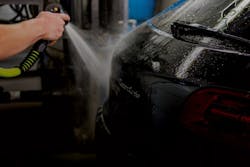If given the opportunity, Ryan Sodikoff can go into great detail about how much of a money drain a detail department can be. The general manager at Steven Toyota in Harrisonburg, Va., was taught that lesson back in 2012.
Thanks to a detail manager who had been caught stealing (and hiring employees with similar character issues), Sodikoff found himself firing his entire, 10-person detail department in one day.
Fortunately, he has used those lessons learned during 2012 to spur an ascent at the facility, which currently boasts a CSI score of 97 percent. Sodikoff knows that it’s important not to overlook detailers, considering their work is often the first thing that catches customers’ eyes when a vehicle is delivered. In 2018, his employer features a “white-glove” detail experience, highlighted by a delivery area that looks like a NASCAR winner’s circle.
Sodikoff, who has worked in the industry for more than a quarter century, shares his thoughts on how to steer clear of any issues with regard to your detail department.
Pay for Productivity.
Due in large part to financial factors, detail departments tend to be populated with inexperienced employees. That doesn’t, however, mean that you shouldn’t have standards during the hiring process, says Sodikoff, who now makes prospective employees go through extensive checks of both their background and driving history.
“We look for motivated folks,” he notes, who has also had success in his career with subcontracting detail work out to a third-party business, in an effort to control costs.
Pre-detail When Possible.
Sodikoff is a firm believer in applying as much “lipstick” to vehicles as possible prior to delivery. As a result, he makes sure that his detailers pre-detail when time permits—a process that can have the added benefit of balancing detailers’ workload throughout an entire day (as a rule of thumb, one car should be delivered to detail every 30–60 minutes). Pre-detailing elements can include tasks as simple as cleaning the interior of a vehicle, or cleaning wheels, while time permits.
“Every vehicle,” Sodikoff explains, “is going to meet my standard before it ever has to meet any customer’s standards.”
Avoid Costly Violations.
Detail departments can quickly turn into pricey burdens if they run afoul of agencies like OSHA. And that can happen rather easily if you’re not careful, considering the myriad chemicals that detailers use, which can, of course, be harmful to the environment. That’s why Sodikoff makes sure that every chemical container at Steven Toyota is labeled appropriately, as part of his “dialed-in process” within the detail department.
“Any OSHA slap on your wrist can cost you no less than $10,000,” Sodikoff notes. “People often aren’t covering their responsibility to the government agencies like OSHA, on how to control your products. … Where I’m at, I’m making money, I’m making profit, and I don’t have that liability.”
Seize Upselling Opportunities.
In Sodikoff’s opinion, detailers should have a fairly specific job role that’s largely limited to washing vehicles. Service advisors, meanwhile, should be given license to sell additional menu items like headlight restoration, or paint protection.
When upselling opportunities are presented to customers respectfully—and without pressure—a detail department can become an additional profit center for a dealership. In Virginia, Sodikoff has experienced upselling success by using menu-based pricing.
Push Quality-Assurance Processes.
At Steven Toyota, the staff takes exhaustive measures to pinpoint any oversights during the detail process. Employees do multiple walkarounds, for example, to point out possible flaws. Sodikoff even utilizes an inventory photographer who occasionally points out areas on vehicles that need to be rebuffed, for example. As part of the final inspection before delivery, everyone involved with detailing at the dealership knows its importance.
“I just need the team to know their role—and that’s to keep cars looking good,” he says.



